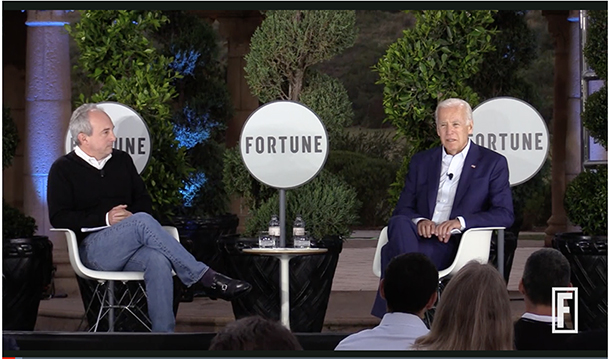The Keck School of Medicine of USC, The Lawrence J. Ellison Institute for Transformative Medicine of USC, and the USC Norris Comprehensive Cancer Center have been proud partners in the Cancer Moonshot Initiative and its vision to double the rate of progress in the understanding, prevention, diagnosis, treatment and care of cancer. David Agus, MD, professor of medicine and engineering and director of the Ellison Institute, interviewed former Vice President Joe Biden on the progress of the Cancer Moonshot and what to look for in the coming months.
The interview took place in front of health care leaders and industry professionals at the second annual Fortune Brainstorm Health conference, held May 2 in San Diego. The former vice president discussed his new Biden Cancer Initiative, which he is founding to continue the work of the Cancer Moonshot. During his 45-minute conversation with Agus, who also is on the board of the Biden Cancer Initiative, Biden emphasized the need for breaking down silos and increasing collaboration and cooperation. He also addressed the need for data sharing to move research forward. The Cancer Moonshot was instrumental in getting 10 countries to agree to share their cancer data with the U.S. His new initiative will now help obtain that data and find ways to aggregate it.
Additionally, they discussed the overwhelming cost of cancer drugs in the United States. The Biden Cancer Initiative is looking at alternate ways to drive down costs, from federal funding for drug development to intellectual property deals between drug companies to get them to work together for the good of everyone.
“When you have a drug that’s been out on the market … that was 15 years ago at $25,000 bucks per year, and now is $180,000 per year, there’s no justification for that,” Biden said.
They also covered the importance of governmental funding for scientific advancement. Biden proudly pointed out that the last spending bill increased spending for the National Institutes of Health.
“I think our Republican colleagues have decided that there are certain things that are just not negotiable,” he said of the NIH funding. Biden added that he felt this type of support not only good for research now, but also will be a key to inspiring future generations of scientists.
Biden also reimagined how the government, academia, nonprofits and the private sector can better organize their resources and systems to collaborate to take on cancer.
“You’ve got to be able to do something to give people some hope,” Biden emphasized.
— Autumn Beemer


